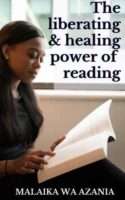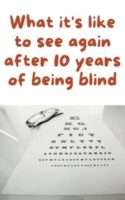Ask anyone what the benefits of reading are and they will likely say it improves one’s vocabulary. As someone who has been an avid reader since early childhood, and who went on to become an internationally acclaimed bestselling author, I can state with authority that this is in fact true. The expansion of vocabulary that arises from reading is immeasurable. And it is through this that you are able to navigate formal education better. I was in the Honour roll throughout high school and would go on to graduate cum laude for my postgraduate degree at Rhodes University. I am presently pursuing a second Masters degree at the University of Johannesburg. None of this is due to any inherent brilliance, it is a product of being an avid reader and therefore, a skilled writer and thinker. The benefits of reading are incalculable. You not only acquire a new language but also, a new way of looking at the world. To read is to see the world behind new lenses – to see not just clearer but also, further.
It was in the Sweet Valley novel series by Francine Pascal that I travelled from my family home, a small shack in the heart of Soweto, into the halls of Sweet Valley High School where along with the Wakefield twins, Jessica and Elizabeth, I journeyed through my pre-teens and adolescence stage. I walked with them through the fictional streets of Sweet Valley in California, and as I did, would often explore other books about the history, geography and politics of the said state. In those books, I became a spectator to American life – it shaped how I made sense of gender, race, class and other issues in a country far from my own. Other books, such as Tsitsi Dangarembga’s Nervous Conditions, would also shape how I make sense of the world. In the streets of post-colonial Zimbabwe, I found parts of my own country. In Tambudzai, I found pieces of myself.
Later, through the writings of John Grisham, I would be a spectator in American courtrooms, making sense of the country’s jurisprudence, contrasting it with our own. I learned a lot about constitutionalism through Grisham. Long before the Taliban were headlining the news following the withdrawal of American and allied troops from Afghanistan, I had walked through the streets of Kabul. In Khaled Husseini’s writings, I became a spectator to the life of women in a country that has been torn asunder by wars and many other forms of violence. And long before I travelled to Mexico as a university student, I had eaten the tacos in my mind. I had seen the people, spoken to them. It was for this reason that when I did in fact visit Mexico for almost a month, living among its people in Mexico City and later, the small town of Tepoztlan in the southern province of Morelos, I felt comfortable. It has been made familiar by the writings of Valeria Luiselli.
My worldview today has been shaped as much by my experiences as by the books I have read. I would have never known that there are child slaves working in the factories of Kathmandu in Nepal, or of the devastating realities of war in various parts of the continent, were it not for books I have encountered. And without knowing this, I would have never become a social activist who is committed to making the world a better place for myself and future generations.
But the value of reading goes beyond the intellectual – it extends to the social and economic. People tend to underestimate the many avenues of financial freedom that are directly associated with reading. Having grown up in a poor working-class family, I had to grow up faster than my peers. I had to take care of myself at an age where most children are still relying on support from their parents. In high school, I had to work to put food on the table, and it was my skill as a reader that came to the rescue. I was employed by the African Independent, a continental publication, to review books for a fee. This monthly wage that amount to R3000 enabled me to keep the lights on at my apartment in Makhanda since I was staying off campus, to buy groceries and to send some money home for my family. I got through university by writing for various newspapers in the country after editors approached me to write for them. They applauded what they claimed was excellent command of language from someone young. This language was developed through extensive reading. Today, owing to years of writing, I get commissioned by international publications to write for them. I even have articles translated to languages I cannot read, but which are shaping how the world sees my country and its people.
But perhaps the biggest value of reading for me has been how it has helped me deal with my mental health struggles. As a child, I suffered from severe depression which was alleviated by the afternoons I spent at the Florida Community Library reading about the adventures of the Wakefield twins, and later as a teenager, the beautiful love stories told by Danielle Steel. In those, I found something to hope for, a love so beautiful it was worth waiting for. As an adult, I continue to battle with depression and generalised anxiety disorder. The latter can be extremely debilitating. But when the going gets tough, I often perch on my couch with a good book in my hands. The person who sits on that couch to read is never the same person who stands up from it when the last chapter is completed. The latter is more optimistic – she knows that better days are coming, that despite all the problems she may be confronted with, the world is a beautiful place and life is worth living.
Reading has saved me many times over. It continues to do so to this day. I am everything I am because at the age of 8 or 9, my mother gave me a booklet to read and I have not stopped reading since.
*Malaika is the bestselling author of Memoirs of a Born Free: Reflections on the Rainbow Nation (2014) and the recently published Corridors of Death: The Struggle to Exist in Historically White Institutions.







